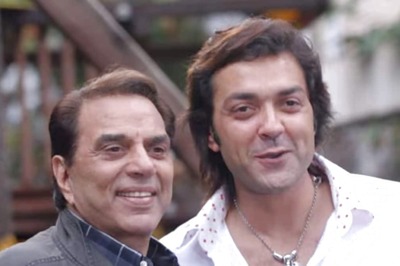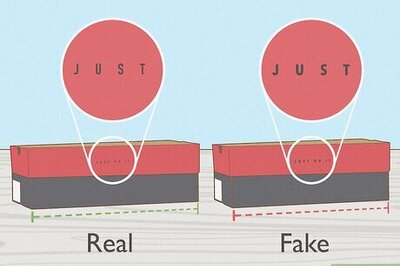
views
Pulwama: An unusual silence draped Gundibagh, an off-track hamlet surrounded by agriculture fields in south Kashmir’s Pulwama district, which went to poll on Monday.
However, in the lawn of the village’s government school, which was designated as a polling station in the last elections, only children were seen playing cricket.
The village’s polling booth has been shifted to the neighbouring Qazigund village this year, but hardly anyone from Gundibagh cast their vote.
On February 14, a 19-year-old Kashmiri suicide bomber, identified as Adil Dar, attacked a Central Reserve Police Force (CRPF) convoy near the Lethpora area of the district on the Jammu-Srinagar national highway.
At least 40 CRPF troopers were killed in what was called the most brutal attack on the forces in the history of Kashmir’s conflict. The attack heightened tensions between the nuclear-armed neighbours, India and Pakistan.
Adil was born and raised in this village. His father Ghulam Hassan Dar, who holds the government responsible for the current situation in the Valley, said, “My son became a suicide bomber and blew himself up into pieces. He also killed troopers, but I am equally pained for my son and the others who were killed.”
He believes that politicians create such a situation in which people take extreme steps the way his son did and that is why no one from Gundibagh went out to exercise their franchise on Monday.
“Politicians in Delhi say they would revoke Article 370, while local politicians promise to protect it. No one is actually intending to do anything with the special status. They just use these issues during polls,” said Dar, who also feels that when politicians come into power they “commit atrocities”.
“In Kashmir, forces are committing crimes, but they do so on the orders of politicians. Soldiers are not to be blamed, but the politicians,” said Dar.
Referring to recent statements made by former J&K chief Minister Mehbooba Mufti on the killing of militants and condemning civilian killings, Dar said, “When she was in power, her rule was the worst. Children were killed and maimed and now, she is wailing and seeking votes.”
Adil’s mother, Fahmeeda, said, elections were irrelevant for her. “People have to make their own choices — if they want to vote, they should. No one is forcing them to stay away from the election,” Fahmeeda told News18, sitting on the veranda of her two-story house, while Dar took long drags of his hookah.
However, most of the polling stations across the two districts of Pulwama and Shopian wore a deserted look. A total of 1.91% polling was reported in Pulwama, while in Shopian, 2.64% people cast their vote.
South Kashmir has been on the edge for the last five years, but the situation worsened after the Burhan Wani, a 21-year-old Hizbul commander, was killed on July 8, 2018.
Hailing from Tral town in Pulwama district, Wani played a pivotal role in attracting Kashmiri youth towards militancy as he uploaded images, videos and audio messages on social media.
Most of the local militants hail from these two districts that have vast apple orchards. The area has also witnessed most of the gunfights in recent times.
In most of the booths, polling staff waited despairingly for voters, even as some polling booths registered single-digit polling.
There were exceptions, though few.
In Shadab Karewa village, people waited in long queues to cast their votes. Even the elderly and ailing villagers came out to get their fingers inked.
“We believe boycott is meaningless. By choosing the right candidate, there can be some change and development,” said 72-year-old, Giyass Ud Din, a retired school teacher.
But most parts of these twin districts remained desolate the entire day as markets were shut and public transport was off the roads.
At some places, there were reports of violence as youth pelted stones at polling booths and police vehicles.
The situation on the ground can be understood by the fact that polling staff to about 25 polling booths was ferried in choppers.
Staff deployed at booths that were barely 5km away from the district headquarters but also provided security and choppers were used.
This was for the first time in the Valley that choppers were used to commute to areas accessible by road.
The state administration and police had worked extensively to create a conducive atmosphere for the polls. As a preventive measure, over 100 youths, who they considered ‘habitual stone-pelters’, were arrested.
However, south Kashmir continues to remain a challenge for the forces and mainstream politicians.
In Baramulla, about 34% voter turnout was recorded and in Srinagar, which saw violence in the last by-poll, about 14% of people cast their votes.
The Anantnag constituency, which includes four districts of south Kashmir, was divided into three phases for the first time.
In the first phase, about 13% polling was recorded, while the second phase registered about 10% voting.
However, with only about 2.5% voters exercising their franchise in the third phase, the cumulative polling percentage in Anantnag constituency stands at about 9%.
South Kashmir has been the bastion of Peoples’ Democratic Party as the Mehbooba Mefti-led party won all the six Assembly seats in Pulwama and Shopian in the last election.
The party had also won all the three parliamentary seats in the Valley in 2014.
This time, however, the PDP appears less confident in south Kashmir. Mehbooba, who is contesting from the Anantnag seat, had a seemingly tough fight and the National Conference is said to have performed better.
But the voter turnout in south Kashmir, particularly in Pulwama and Shopian, reflects the further decline in popularity of mainstream politics.
Those who are angry with the PDP’s rule did not seem to have high hopes from other parties.
Militancy, which doesn’t seem to be ending in this part of Kashmir, is also a concern. And the support they are getting is the apparent failure of policies from the incumbent government and the BJP-PDP, which ruled the state till recently.













Comments
0 comment